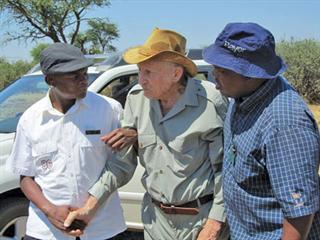<br /> Although agriculture hardly got a mention in the 2007 national budget speech of finance minister Trevor Manuel, spending allocations in other areas of the economy will arguably have indirect spin-offs for the sector. Experts who participated in a panel discussion following the budget speech expressed concern that the absence of agriculture and clear rural development policies meant the sector was a declining state priority, but others argued it will still benefit from government’s sound fiscal discipline. Wilma den Hartigh reports.<br /> <br /> The only mention of agriculture in the national budget was its poor performance in 2006, but agricultural experts and organised agriculture said government should not disregard this primary sector and its contribution to livelihoods in rural areas. I n his budget presentation, finance minister Trevor Manuel said government’s spending priorities are informed by overriding objectives of accelerating growth, modernising public services and infrastructure, and reducing poverty and inequality. Dr Tobias Doyer, CEO of the Agricultural Business Chamber, said the absence of agriculture and the strong social orientation of the 2007/08 budget echo government’s spending priorities. “The budget is socially positive, economically neutral, but agriculturally negative,” he said. Doyer said the ANC’s policies are geared to improving urban areas, and added that regardless of the budget orientation, “agriculture is still one of the most important sectors in the economy, even though the minister of finance doesn’t think so.” Dr John Purchase, general manger of Grain SA, said the absence of rural development policies in the budget is a concern. said the biofuels industry has an important role to play in kick-starting rural development and creating semi-skilled jobs in rural areas. “We must not kill the goose that lays the golden eggs by not investing in initiatives like biofuels,” he said. A gribusiness specialist Prof André Louw also expressed concern that the budget noticeably lacked allocations for rural development. Motsepe Matlala, president of the National African Farmers’ Union, said the national budget will not be sufficient to effectively support the agricultural sector and its support initiatives such as Nepad. He said the organisation was expecting a reasonable budgetary injection to revive the ailing sector and its support services. “We look at the budget as a wake-up call for black and white farmers of SA, to make sure that the image of agriculture is changed for the better,” he told AgriTV. H owever, Agri SA executive director Hans van der Merwe said there was no cause for alarm. “The long-term approach for agriculture did not necessarily change. Most of the projects that aim to develop agriculture are in place.” Infrastructure Bennie van Zyl, general manager of TAU SA, expressed concern that additional infrastructure spending will only be to the benefit of the 2010 World Cup after Manuel announced the SA National Roads Agency and the Rail Commuter Corporation will receive a further R1,7 billion to upgrade roads and stations in areas critical to the event. n total, over R9 billion will be allocated for municipal transport, roads and precinct upgrading. owever, Prof Louw said there will be a direct overflow of infrastructure development investments into rural areas, particularly in places such as Polokwane, Nelspruit and Rustenburg where stadiums are to be constructed. bsa agricultural economist Marius Nel said, “The budget is a let-down because there was no mention of agriculture and land reform, and this means there is a lack of focus on these activities.” owever, he said depreciating incentives will impact positively on the agricultural sector. Manuel proposed that environmental capital structures such as dams and tanks, which are presently not depreciable, qualify for depreciation allowances. Crime By 2010 SA will have close to 190 000 police officers. An additional R2,4 billion will be allocated to further expand police numbers and invest in technology and forensic equipment. Manuel said effective crime fighting depends on partnerships between law enforcement agencies and communities. He added that through community police forums, citizens can contribute to having safer communities. gri SA president Lourie Bosman applauded Manuel’s comprehensive approach towards combating crime.
Budget: Views on an ‘agriculturally negative’ budget speech
Although agriculture hardly got a mention in the 2007 national budget speech of finance minister Trevor Manuel, spending allocations in other areas of the economy will arguably have indirect spin-offs for the sector.
Issue Date: 9 March 2007









